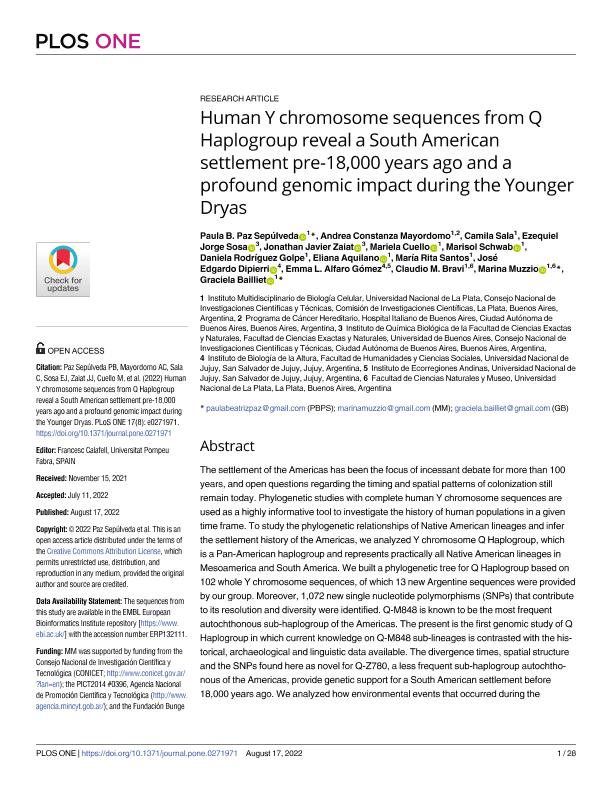Artículo
Human Y chromosome sequences from Q Haplogroup reveal a South American settlement pre-18,000 years ago and a profound genomic impact during the Younger Dryas
Paz Sepúlveda, Paula Beatriz ; Mayordomo, Andrea Constanza
; Mayordomo, Andrea Constanza ; Sala, Camila; Sosa, Ezequiel
; Sala, Camila; Sosa, Ezequiel ; Zaiat, Jonathan Javier
; Zaiat, Jonathan Javier ; Cuello, Mariela Vanesa
; Cuello, Mariela Vanesa ; Schwab, Marisol Elisabet
; Schwab, Marisol Elisabet ; Rodríguez Golpe, Daniela Carmen
; Rodríguez Golpe, Daniela Carmen ; Aquilano, Eliana Anahi
; Aquilano, Eliana Anahi ; Santos, María Rita
; Santos, María Rita ; Dipierri, Jose Edgardo; Alfaro Gómez, Emma Laura
; Dipierri, Jose Edgardo; Alfaro Gómez, Emma Laura ; Bravi, Claudio Marcelo
; Bravi, Claudio Marcelo ; Muzzio, Marina
; Muzzio, Marina ; Bailliet, Graciela
; Bailliet, Graciela
 ; Mayordomo, Andrea Constanza
; Mayordomo, Andrea Constanza ; Sala, Camila; Sosa, Ezequiel
; Sala, Camila; Sosa, Ezequiel ; Zaiat, Jonathan Javier
; Zaiat, Jonathan Javier ; Cuello, Mariela Vanesa
; Cuello, Mariela Vanesa ; Schwab, Marisol Elisabet
; Schwab, Marisol Elisabet ; Rodríguez Golpe, Daniela Carmen
; Rodríguez Golpe, Daniela Carmen ; Aquilano, Eliana Anahi
; Aquilano, Eliana Anahi ; Santos, María Rita
; Santos, María Rita ; Dipierri, Jose Edgardo; Alfaro Gómez, Emma Laura
; Dipierri, Jose Edgardo; Alfaro Gómez, Emma Laura ; Bravi, Claudio Marcelo
; Bravi, Claudio Marcelo ; Muzzio, Marina
; Muzzio, Marina ; Bailliet, Graciela
; Bailliet, Graciela
Fecha de publicación:
08/2022
Editorial:
Public Library of Science
Revista:
Plos One
ISSN:
1932-6203
Idioma:
Inglés
Tipo de recurso:
Artículo publicado
Clasificación temática:
Resumen
The settlement of the Americas has been the focus of incessant debate for more than 100 years, and open questions regarding the timing and spatial patterns of colonization still remain today. Phylogenetic studies with complete human Y chromosome sequences are used as a highly informative tool to investigate the history of human populations in a given time frame. To study the phylogenetic relationships of Native American lineages and infer the settlement history of the Americas, we analyzed Y chromosome Q Haplogroup, which is a Pan-American haplogroup and represents practically all Native American lineages in Mesoamerica and South America. We built a phylogenetic tree for Q Haplogroup based on 102 whole Y chromosome sequences, of which 13 new Argentine sequences were provided by our group. Moreover, 1,072 new single nucleotide polymorphisms (SNPs) that contribute to its resolution and diversity were identified. Q-M848 is known to be the most frequent autochthonous sub-haplogroup of the Americas. The present is the first genomic study of Q Haplogroup in which current knowledge on Q-M848 sub-lineages is contrasted with the historical, archaeological and linguistic data available. The divergence times, spatial structure and the SNPs found here as novel for Q-Z780, a less frequent sub-haplogroup autochthonous of the Americas, provide genetic support for a South American settlement before 18,000 years ago. We analyzed how environmental events that occurred during the Younger Dryas period may have affected Native American lineages, and found that this event may have caused a substantial loss of lineages. This could explain the current low frequency of Q-Z780 (also perhaps of Q-F4674, a third possible sub-haplogroup autochthonous of the Americas). These environmental events could have acted as a driving force for expansion and diversification of the Q-M848 sub-lineages, which show a spatial structure that developed during the Younger Dryas period.
Palabras clave:
Y-CHROMOSOME
,
HAPLOGROUP
,
Q-M3
,
NATIVE AMERICAN
,
SOUTH AMERICA
Archivos asociados
Licencia
Identificadores
Colecciones
Articulos(IMBICE)
Articulos de INST.MULTIDISCIPL.DE BIOLOGIA CELULAR (I)
Articulos de INST.MULTIDISCIPL.DE BIOLOGIA CELULAR (I)
Articulos(INECOA)
Articulos de INSTITUTO DE ECORREGIONES ANDINAS
Articulos de INSTITUTO DE ECORREGIONES ANDINAS
Articulos(IQUIBICEN)
Articulos de INSTITUTO DE QUIMICA BIOLOGICA DE LA FACULTAD DE CS. EXACTAS Y NATURALES
Articulos de INSTITUTO DE QUIMICA BIOLOGICA DE LA FACULTAD DE CS. EXACTAS Y NATURALES
Citación
Paz Sepúlveda, Paula Beatriz; Mayordomo, Andrea Constanza; Sala, Camila; Sosa, Ezequiel; Zaiat, Jonathan Javier; et al.; Human Y chromosome sequences from Q Haplogroup reveal a South American settlement pre-18,000 years ago and a profound genomic impact during the Younger Dryas; Public Library of Science; Plos One; 17; 8; 8-2022; 1-28
Compartir
Altmétricas



